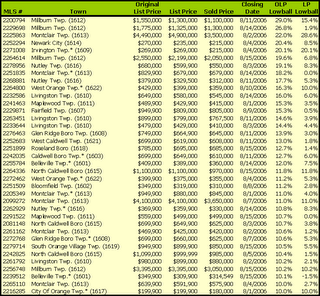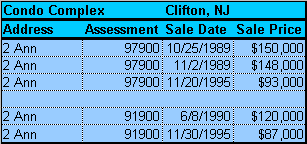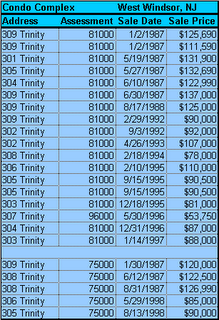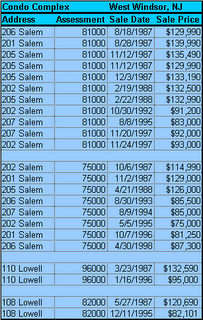Welcome to another edition of Price Reduced!
For all the newcomers to this blog, Price Reduced! takes a look at a handful of significant price reductions across Northern NJ. The purpose of this exercise is to serve as proof that the Northern New Jersey real estate market has long since been overvalued and has started the long hard decline back to the mean. These listings are in no way an endorsement by me, nor do I believe they are a bargain or a value. Even reduced, I still believe these homes are still grossly overpriced.
On to the list!
MLS# 2219533 - Bridgewater, NJ
Previous Price $669,900
Current Price $483,537 (Price Reduced 27.8%)
(New Construction, price reduction might reflect design changes)
MLS# 2308114 - Haledon, NJ
Previous Price $299,900
Current Price $229,900 (Price Reduced 23.3%)
MLS# 2257103 - Franklin Twp, NJ
Previous Price $2,500,000
Current Price $1,999,900 (Price Reduced 20%)
MLS# 2278877 - Wantage, NJ
Previous Price $399,000
Current Price $325,000 (Price Reduced 18.5%)
MLS# 2307369 - Tenafly, NJ
Previous Price $1,200,000
Current Price $999,999 (Price Reduced 16.7%)
MLS# 2265000 - Montgomery, NJ
Previous Price $745,000
Current Price $629,500 (Price Reduced 15.5%)
MLS# 2297795 - Oakland, NJ
Previous Price $349,900
Current Price $299,000 (Price Reduced 14.5%)
MLS# 2281058 - Blairstown, NJ
Previous Price $1,750,000
Current Price $1,499,900 (Price Reduced 14.3%)
MLS# 2281707 - Parsippany, NJ
Original List Price $199,000
Previous Price $174,900
Current Price $149,900 (Price Reduced 14.3%, 24.7% off OLP)
MLS# 2303392 - Frelinghuysen, NJ
Previous Price $575,000
Current Price $495,000 (Price Reduced 13.9%)
MLS# 2292034 - Phillipsburg, NJ
Previous Price $110,000
Current Price $95,000 (Price Reduced 13.6%)
MLS# 2263675 - Parsippany, NJ
Previous Price $449,900
Current Price $389,900 (Price Reduced 13.3%)
MLS# 2261514 - Kinnelon, NJ
Original List Price $1,500,000
Previous Price $1,495,000
Current Price $1,299,000 (Price Reduced 13.1%, 13.4% off OLP)
MLS# 2293197 - Scotch Plains, NJ
Previous Price $1,150,000
Current Price $999,900 (Price Reduced 13.1%)
MLS# 2290765 - Mine Hill, NJ
Original List Price $529,900
Previous Price $515,000
Current Price $449,900 (Price Reduced 12.6%, 15.1% off OLP)
MLS# 2264082 - Bernardsville, NJ
Original List Price $2,950,000
Previous PRice $2,795,000
Current Price $2,450,00 (Price Reduced 12.3%, 16.9% off OLP)
MLS# 2282243 - Wantage, NJ
Previous Price $1,250,000
Current Price $1,100,000 (Price Reduced 12%)
MLS# 2298374 - Delaware Twp, NJ
Previous Price $289,500
Current Price $255,000 (Price Reduced 11.9%)
MLS# 2290487 - Bloomingdale, NJ
Previous Price $595,000
Current Price $524,000 (Price Reduced 11.9%)
MLS# 2261474 - Delaware Twp, NJ
Previous Price $849,900
Current Price $749,900 (Price Reduced 11.8%)
MLS# 2300373 - Wayne, NJ
Previous Price $850,000
Current Price $749,900 (Price Reduced 11.8%)
MLS# 2222350 - Alexandria, NJ
Previous Price $850,000
Current Price $750,000 (Price Reduced 11.8%)
MLS# 2289994 - Montague, NJ
Previous Price $425,000
Current Price $375,000 (Price Reduced 11.8%)
MLS# 2300603 - Passaic, NJ
Previous Price $339,000
Current Price $299,900 (Price Reduced 11.5%)
MLS# 2292687 - Dover, NJ
Original List Price $489,900
Previous Price $449,900
Current Price $399,900 (Price Reduced 11.1%, 18.4% off OLP)
MLS# 2294449 - Knowlton, NJ
Previous Price $899,900
Current Price $799,900 (Price Reduced 11.1%)
MLS# 2265797 - High Bridge, NJ
Original List Price $329,900
Previous Price $319,900
Current Price $284,900 (Price Reduced 10.9%, 13.6% off OLP)
MLS# 2300440 - Bernardsville, NJ
Previous Price $2,430,000
Current Price $2,174,000 (Price Reduced 10.5%)
MLS# 2306162 - West Paterson, NJ
Previous Price $699,000
Current Price $629,000 (Price Reduced 10%)
MLS# 2278473 - New Providence, NJ
Previous Price $499,900
Current Price $449,900 (Price Reduced 10%)
MLS# 2257816 - Frenchtown, NJ
Original List Price $529,000
Previous Price $499,000
Current Price $450,000 (Price Reduced 9.8%, 14.9% off OLP)
MLS# 2275644 - Clark, NJ
Original List Price $799,000
Previous Price $759,000
Current Price $689,000 (Price Reduced 9.2%, 13.8% off OLP)
MLS# 2264096 - Wyckoff, NJ
Original List Price $1,169,900
Previous Price $1,099,000
Current Price $999,900 (Price Reduced 9%, 14.5% off OLP)
Caveat Emptor!
Grim






